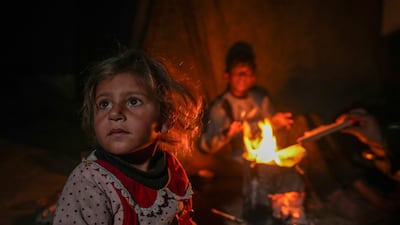When Pope Francis this weekend condemned Israeli air strikes on Gaza as “cruelty, not war”, he was articulating the feelings of many across the Middle East and further afield who are appalled not only by the intensity of suffering in the Palestinian enclave but by the different forms it takes.
The direct deaths caused by Israeli bombardments and gunfire run parallel with the fatalities caused by manmade hunger and disease. Injuries – psychological as well as physical – also highlight the incalculable human cost of this war.
In a special report published by The National at the weekend, Gaza resident Hussam Jundia, a 38-year-old father of six, described how he lost his right eye, left leg at the knee and use of his right hand in an Israeli strike that killed his uncles, cousin and injured his four-year-old son. He joins hundreds of other amputees in the enclave, which the UN says has the largest population of child amputees in modern history.
Just as horrific is how Israel’s attacks have wrecked maternity care in the enclave, with some mothers going through C-sections and other major surgery with only general painkillers such as paracetamol. In August, the trauma endured by Gazan children was exemplified by eight-year-old Sama Tabil, , a displaced Palestinian girl whose hair fell out from psychological shock. Amid these outrages, the fate of the remaining Israeli hostages abducted by Hamas and other militants during the October 7 attack is unknown.
There may be a fine line between false hope and optimism, but all those aghast at such prolonged human suffering are hoping recent suggestions that a ceasefire is closer now than it has been for months brings this war to an end. Hamas and US officials have reportedly raised hopes that negotiations in Doha and Cairo could bear fruit.
In a statement, Hamas said "an agreement for a ceasefire and prisoner exchange is possible if [Israel] stops setting new conditions". Sources briefed on the negotiations told The National that a team from Israel’s Mossad and its domestic security counterpart Shin Bet were in Doha recently to iron out technical details of a possible deal.
Talks have been close before and several rounds of previous ceasefire talks have led to naught. So, are there grounds for hope this time? Some developments in the run-up to these latest ceasefire reports suggest that there may be some real momentum behind a deal. Earlier this month, Hamas appeared to soften its position, agreeing in principle to an Egyptian proposal for a 30-day truce and the release of some of the Israeli hostages. In addition, Qatar has resumed its mediation role and reports of a joint Fatah-Hamas plan to administer Gaza suggest that some serious thought is being given to its post-war future.
Diplomatically, the issue of Palestine remains high on the international agenda with the UN General Assembly last Tuesday adopting a resolution affirming the Palestinian people’s right to self-determination by an overwhelming majority.
Nevertheless, such potential must be accompanied by caution. Israeli Defence Minister Israel Katz has said that his country must retain security control of Gaza, revealing the same thinking that helped create the very conditions the fuelled militancy in the enclave for years. There are also several risks potentially undermining any ceasefire, such as the Palestinian Authority’s waning support among people in the occupied West Bank and the continuing violent conflict between Israel, western forces and Yemen’s Houthi rebels.
Such caution is justified but if the horrors being endured by the people of Gaza are to be brought to an end, then any faint momentum behind a ceasefire must be maintained.









